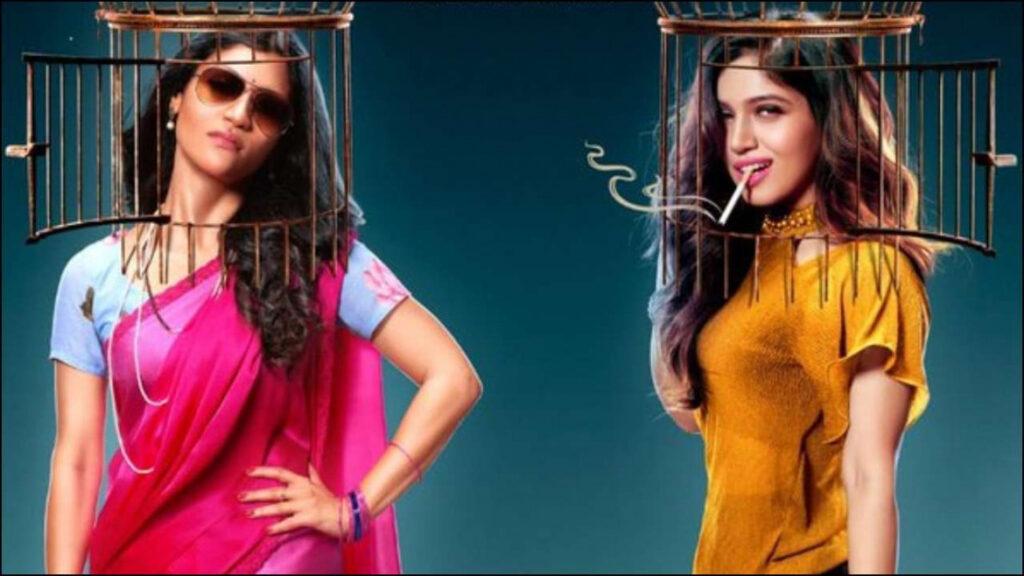How to make a ‘woke film’?
- Female sexuality = A woman can cheat. A woman can instantly leave anyone who does not satisfy her sexually, even if it is the father of her two children.
- Throw in an element of caste
- Throw some Hinduphobia
- Throw some gender identity crisis for a child
- Make the women abuse because it is cool!
And Tada! The mess is ready!
Half an hour into this movie, I told my partner, ‘Movie ka kuch sar par pata nahi chal raha hai’. Something in Dolly (Konkana’s) demeanor reminded me of ‘Lipstick under my burkha.’ It was only after watching the movie and doing some research, I realized that both movies were directed by the same person, and that the central theme was supposed to be female sexuality.
Except that ‘Lipstick under my burkha’ was a very interesting, refreshing story. Ratna Pathak’s storyline was very compelling. Sharing a link to my review of the ‘lady oriented’ movie. One of the things I liked about it was the ending. Nothing drastic happened. They were not trying to make a point. They were not forcing us to believe anything. They were not trying to convince us. They showed us the raw desires of four women of different age groups going about with their routine (dual) life.
This is where Dolly Kitty differs and fails! Unfortunately, this movie forces its skewed narrative of female sexuality and empowerment in our face.
SPOILER ALERT!!!! Please do not read further if you plan to watch this movie. Come back once you watch it!
Dolly (Konkana) is a married, middle class working woman, a mother of two sons who is planning to move to a newly built luxury apartment soon. She likes to steal money from her office and lies to her husband about selling her jewelry in order to pay for their dream flat. Dolly falls for a delivery boy and ends up sleeping with him. She then realizes that she was not ‘frigid’. She just did not find her husband attractive. This revelation makes her decide to leave her husband!
Kitty or Kajal (Bhumi) is a small-town girl who has reached the big city to pursue her dreams. When I say dreams and you are thinking that she wants to get a good job, update her skills, and get higher education, you are wrong. Her dream is to lose her virginity! Bhumi looks too mature and well kept to portray a naïve, young, poor, unsophisticated little thing.
Conclusion of the movie
A married woman who confessed to having her hymen stitched before marriage to deceive her husband, after cheating on him decides to leave him along with her two sons because:
Hey! My body my choice! I live for an orgasm!
Dolly was abandoned as child by her mother for a lover, something that traumatized her. She probably knows the impact it has on a family. Why does she choose the same path? What effect will this have on her kids? What is her financial plan?
Who cares!
A young woman working as a call center executive who provides phone sex/ companionship services to lonely, frustrated men gives a speech on how she is not ashamed of her job, and how something similar should be created for women. The makers also show women empowerment by installing a model of vagina, and showing blood stained bed sheets as a sign of losing virginity. This only further adds to the myth that all women bleed the first time!
There seemed to be a plot about the real estate scams of Noida but the writers forgot about it towards the end of the movie. Even they could not try to keep track of the messy storylines! In a bizarre finale, Hindu goons end up killing the only two characters of another religion!
Is this women empowerment?
There have been movies made on female sexuality in Bollywood. The best I can think of is Astitva. The movie had a plot, a strong storyline and hard-hitting dialogues. I can never forget the conversation between Tabu and her chauvinist husband, in which she questions him. It was so powerful.
In Dolly Kitty… Dolly’s husband is made to show the villain because he tried to touch his wife’s cousin and the makers believe this justifies her cheating on him and leaving him. In a pathetic scene, the poor husband tells her that they should work it out, even try counseling but our empowered heroine is done with him. They also want us to believe that the young delivery boy is noble because he promises to marry her! After leaving her husband, Dolly magically allows her son to play with dolls and dress up a girl, something she has so far been disapproving of. Dolly’s husband is also a villain because he tried the phone sex app, the same app that Kajal justifies for women.
Let us reverse the gender in all of this. Would we appreciate a movie where a married man with two kids cheats on his wife and leaves her because he does not enjoy sex with her? Kajal advocates apps for women where women will get two minutes of companionship from unknown men. Is this what women want? Is this what men what? Is this all anyone wants from life? Few minutes of gratification? In a time when we talk about mental health, lack of fulfilling relationships and loneliness arising out of casual flings and what truly matters in life, what kind of a message is the movie trying to give?
Roses are red
Violets are blue
Let’s smash the hypocrisy
Me and you.
